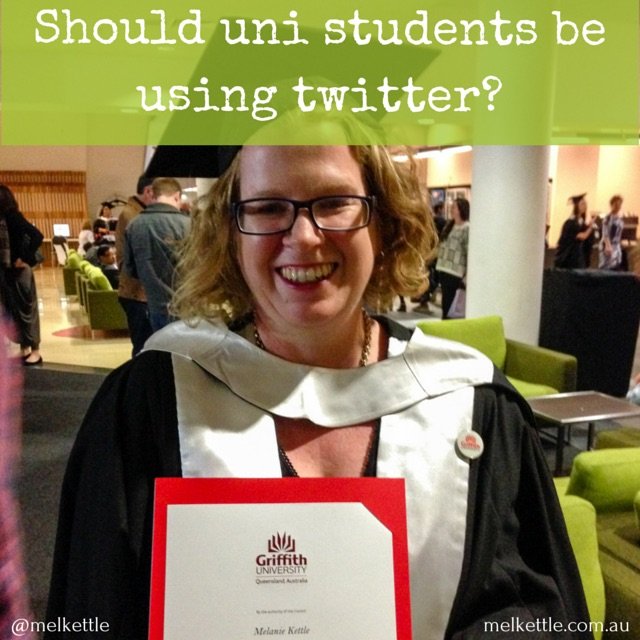Should uni students be using twitter? (answer = yes)
Someone the other day was asking if uni students should be using twitter.
I couldn’t shout YES quickly enough.
Anyone who followed me on twitter between 2012 and 2014 would have seen a lot of my tweets with the hashtags #unitweet, #studying, #assignmenthell, #whatwasIthinking, and the more than occasional #procrastibaking.
Yes, I was a uni student. #whatwasIthinking
Surprisingly to many I was not studying marketing or comms, but rather a Master of Public Health. It’s a bit of a long story, but in a nutshell, I have always had an interest in health and specifically in public health. Twelve years prior I had considered studying public health but decided it would be more beneficial to do a Master of Business in marketing. So I did. And it was great. Met fantastic people, learned a lot, my career benefited enormously. But that desire to work more in the public health space didn’t go away.
So in 2012 I enrolled to study a Master of Public Health. I was one of two in my class who didn’t have a background in health (the other was an accountant who, like me, also wanted to do things for good rather than just helping other people make lots of money). And it was brilliant. I loved every moment (except for stats. Didn’t love stats.).
I finished with a GPA of 6.17 (out of 7) and I directly attribute at least one of those GPA points to everyone on twitter who engaged with me during the two and a half years it took me to complete my degree.
You see, I used twitter to keep me entertained during the late nights writing assignments and to motivate me when I needed that little extra push. However I also actively used twitter to crowdsource my assignments.
My best crowdsourcing success was this: I was sitting in a lecture listening to the lecturer talk about the impact of legislation on public health. I tweeted “what do people think about the impending plain packaging of tobacco legislation in Australia?”. Within about an hour I had responses from three cancer councils, three heart foundation organisations and two big tobacco companies, all sending me links to their position papers. I also heard from a couple of world renowned experts in this field and about fifty private opinions. Many responses included links to articles and information, a few connected me to other people to talk to.
What this boiled down to, was that with only seconds of effort, I had the majority of the information I needed for an assignment on this topic. (It was awarded a distinction grade in case you are wondering. And while I didn’t reference a tweet in this assignment, I did in another).
What truly astounded me was that very few of my fellow students were also using twitter. And none of my lecturers were. Even the lecturer for the subject I did in the School of Marketing didn’t use twitter. Such a wasted opportunity given twitter is such a brilliant academic tool. What horrified me the most wasn’t that they weren’t using twitter, but that they weren’t even open to the possibilities and opportunities it could unleash. Ridiculous.
So, what do you need to do if you’re a uni student wanting to capitalise on using twitter:
follow people in your field (hint: follow interesting people the people you follow are following) – this might include academics, researchers, other students, professionals, industry associations, journalists – for a good laugh make sure you follow @LegoAcademics
follow relevant hashtags – some that really helped me were #PhDchat #ECRchat (early career researchers), #hcsmanz (healthcare social media Australia and NZ), #hcsm, however you should search for hashtags based on your field of interest and area of study
start conversations with people you follow so you can start building useful and interesting networks
ask questions to do with your field of study – I tweeted ALL my assignments and always asked if anyone had information to share. It was rare I didn’t get at least five replies, often with links to useful research I could use
join twitter chats in your field of interest – I found the weekly #PhDchat very helpful, also the weekly #hcsmanz chat
follow relevant rotation curation accounts – one of my favourites is @WePublicHealth – a different public health expert every week to learn from
follow relevant conference hashtags – and if you are at a conference, then live tweet it. A great way to learn the latest information in your field without having to leave home
discuss issues, debate and seek public opinion in your area of interest – also, a great way to meet new people
share your expertise – this will help position you as an expert, which will be VERY helpful come graduation time when you are looking for a job.
Are you studying? Are you using twitter? How has it helped you with your studies? If you’re not, why not??
P.S. Uni students today have it easy. My first foray into university life was in 1989. When I typed my assignments on an electric typewriter and spent hours and hours and hours in the library researching. Where was twitter then?? Actually, I would have settled for basic internet. And Google.
If you liked this post, consider signing up to my newsletter (out every Thursday) where I talk about marketing, communication and social media matters, and sometimes a few other topics that interest me.
You can also follow me on twitter, Instagram, Pinterest or Instagram.

